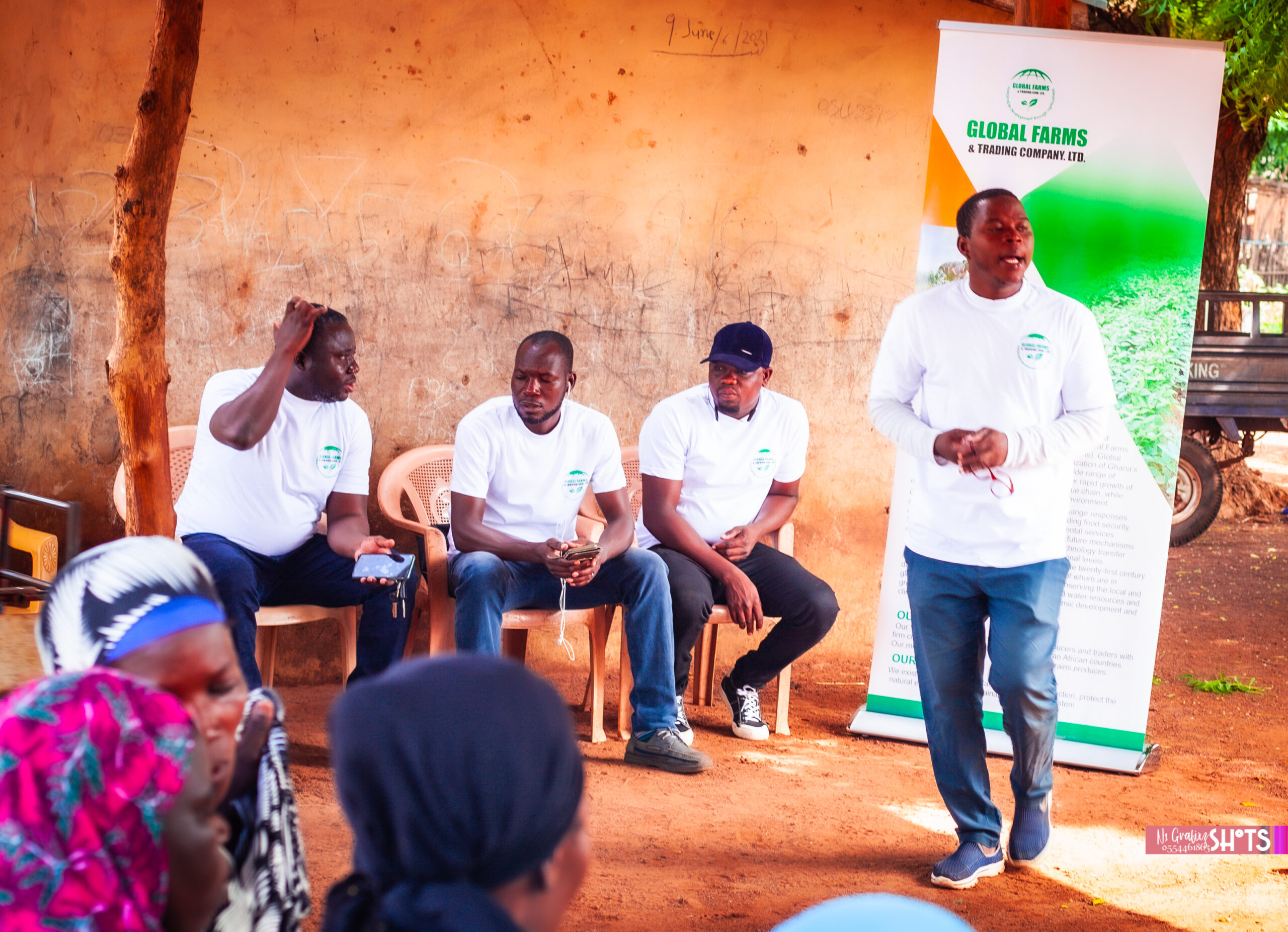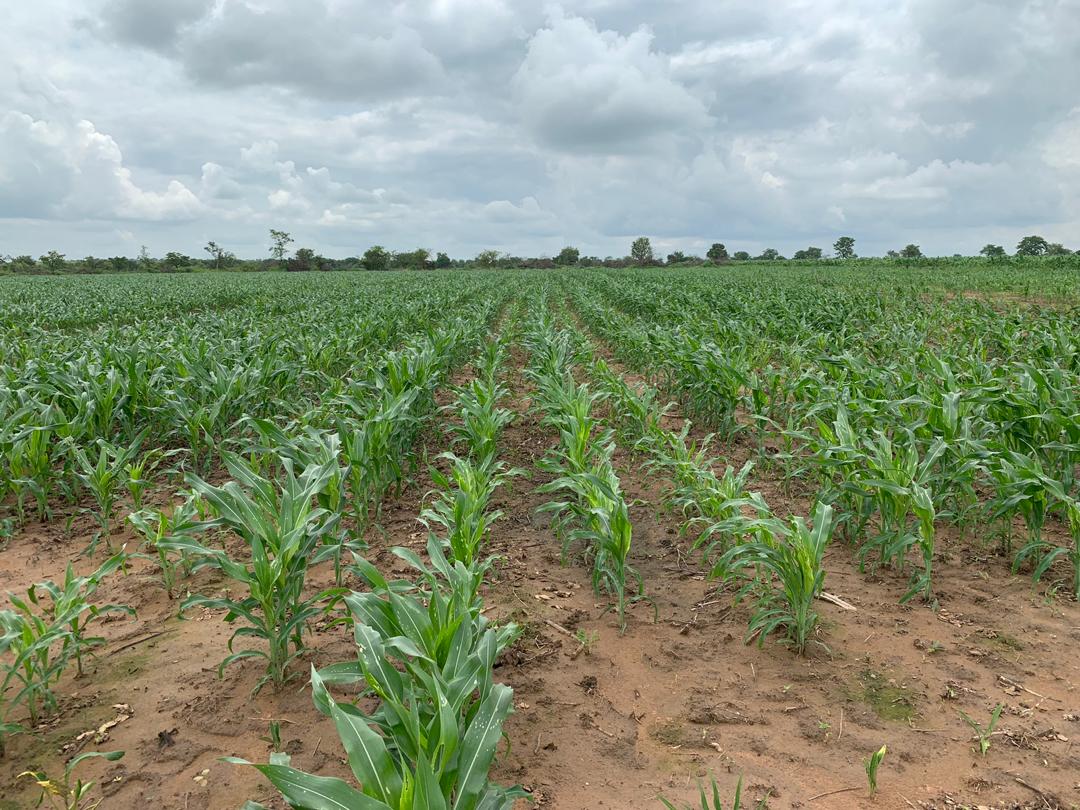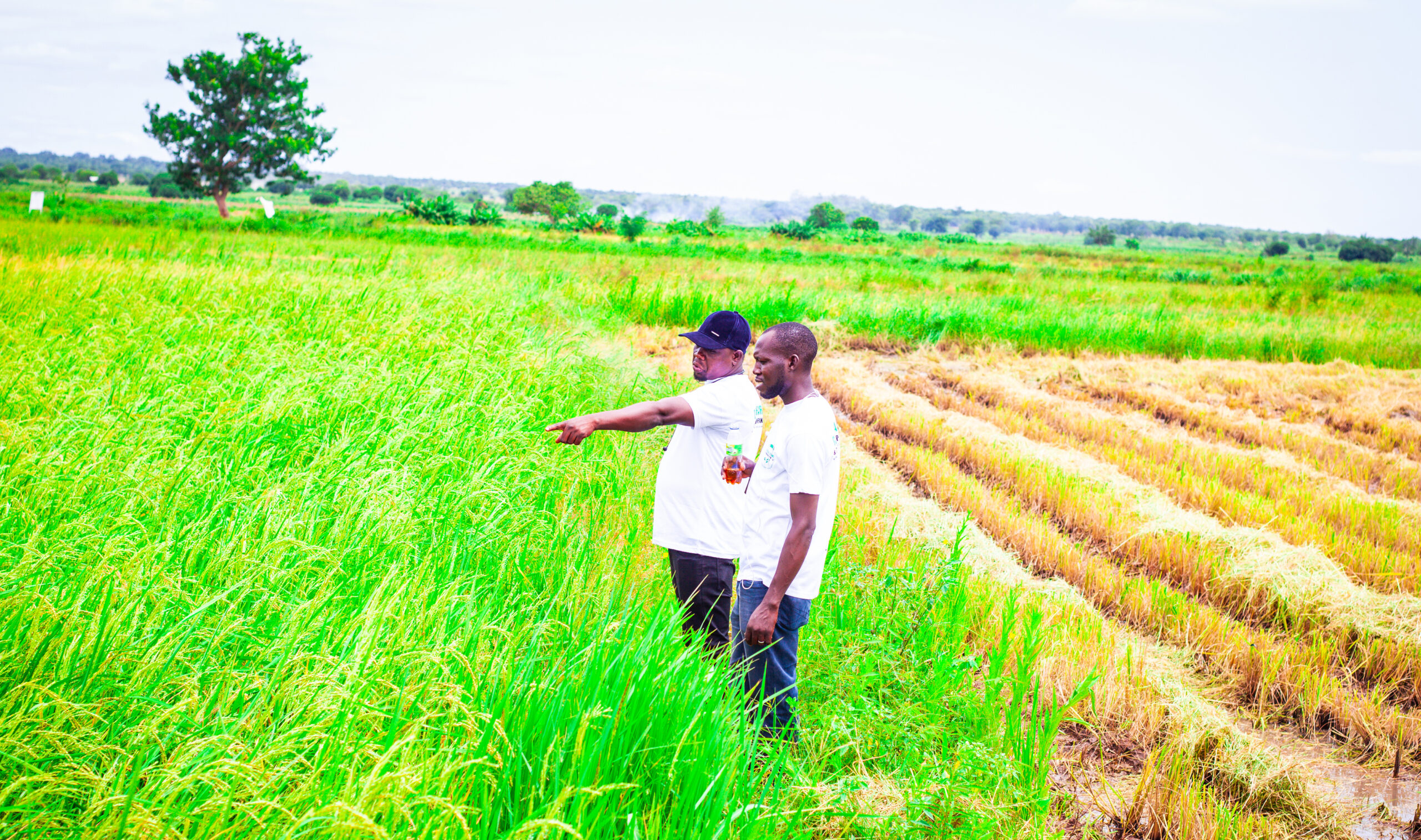Tackling food insecurity through education: How one YouthADAPT winner is empowering Ghanian farmers to embrace sustainable agriculture practices
By adopting climate-resilient farming and conservation agricultural techniques and having access to quality and improved seeds, YouthADAPT winner Global Farms and Trading Company has helped smallholder farmers to increase their production volumes and yield.
I
n Ghana, changing rainfall patterns are leading to an increasing number of extreme and frequent weather events. This has resulted in excessive flooding, prolonged droughts and severe storm surges that are having a negative impact on land degradation and agricultural practices. For smallholder farmers in particular, it has become increasingly difficult to ensure sufficient, reliable and good quality crop yields under these conditions.
In 2021, Global Farms and Trading Company was one of the 15 winners of the African Youth Adaptation (YouthADAPT) Solutions Challenge, an annual competition organized by the Global Center on Adaptation (GCA), the African Development Bank (AfDB) and Climate Investment Funds (CIF). Every winning business receives a development grant of US$100,000 and the opportunity to partake in a 12-month business accelerator program that is aimed at scaling up their business, increasing their impact, and creating more jobs. The YouthADAPT Challenge empowers and supports youth-led businesses that want to make a difference in climate adaptation and resilience.
In an interview with GCA, Global Farms and Trading Company co-founders Suleman Saamani Elisha Mahama and Tahiru Jamila shared how winning the YouthADAPT challenge helped them expand the impact of their business, enabling them to improve local food security in Northern Ghana, as well as build the capacity and knowledge of local smallholder farmers through education and training on sustainable agricultural practices. Currently, Global Farms works across four districts in northern and central Ghana – Mion, Kumbungu, Central Gonja and West Mamprusi Districts. Their mission is to build resilience, increase food security, and provide an efficient yet sustainable market system for smallholder farmers that also functions as a profitable business.

Through the YouthADAPT grant, in partnership with Savannah Zone Agricultural Productivity Improvement Project (SAPIP) and the Ministry of Food and Agriculture Ghana, Global Farms and Trading Company initiated a wide-ranging project in north, northeast and central Gonja, to help smallholder farmers through capacity building, access to quality inputs, and market access.
First, smallholder farmers were trained on how best to adopt agricultural conservation practices in order to improve soil structure, and enhance water retention, organic matter content and fertility, which would result in higher and more stable yields. Second, the company assisted farmers in procuring high-quality, climate-tolerant seeds and soil nutrients to improve production yields. Third, the company supported the smallholder farmers in transporting, storing and selling their produce to bulk buyers, and negotiating better prices while also reducing farmers’ transport and marketing costs.
Central to the project was identifying and involving stakeholders from local communities – including chiefs, opinion leaders, and community members – who received training to enable them to lead the project effectively at a local level. Working groups and advisory committees were also established to provide input and guidance, which in turn fostered collaboration. The project team consisted of 150 people, including Global Farms staff and farming community members that were recruited to be part of the planning and working committees.
Around 1,500 smallholder farmers – the majority of which are women – benefitted directly from the project through capacity building and training, input supply and field demonstrations. This emphasis on skills development and training extended to people with disabilities, for whom skills training sessions in soap making, food processing and storage methods were held. A further 1,500 individuals benefitted indirectly.
What inspired you to start your enterprise?
Tahiru Jamila: In Ghana and across Africa, it is the community folks who are the most impacted by the effects of climate change, especially the smallholder farmers. I felt there was a need to design a method of information sharing that would enable farmers to adopt improved farming practices, to mitigate the impact of climate change both on their farms and in their communities.
Capacity building through climate smart agricultural practices is one of the major proven solutions that can have a positive impact on the lives and livelihoods of farmers. Global Farms provides education on good conservation practices for agriculture; information on the benefits of practicing zero or minimum tillage, intercropping, and introducing seed variety; as well as the advantages to using environmentally friendly pest control. For example, we teach farmers critical knowledge such as the importance of planting trees around their fields to hold the soil together, and how this is particularly helpful in the event of flooding to prevent erosion.
What changes did you observe as a result of your solution?
Tahiru Jamila: There have been massive improvements in the communities where we have made interventions. Not only has there been an improvement in the quality of the grains produced, but we have also recorded a high record of yields as well as an enhanced food security system since we began working in the area. There has also been a reduction in malnutrition-related illnesses and deaths in these communities.

What led you to apply to the YouthADAPT challenge last year?
Tahiru Jamila: The ambition and opportunity to scale up our solution and grow the company to where we wanted to take it, motivated us to apply for the YouthADAPT Challenge. It presented a great opportunity for youth-led startups to go through mentorship and provided a platform to implement our proposed project across a wider audience.
How did your project help improve the lives of smallholder farmers?
Mahama Saamani Elisha: As a result of the impact of the project Global Farms was given a local name ‘Wunpini’, which means ‘blessing, by the secretary of the women group involved in the program.
By adopting climate-resilient farming and conservation agricultural techniques and having access to quality and improved seeds, smallholder farmers have increased their production volumes and yield. Farmers now get competitive market prices for their produce, thereby improving both their economic standards and that of their families.
By adopting climate-resilient farming and conservation agricultural techniques and having access to quality and improved seeds, smallholder farmers have increased their production volumes and yield. Farmers now get competitive market prices for their produce, thereby improving both their economic standards and that of their families.

What benefits and resources did you personally derive from the YouthADAPT mentoring program?
Tahiru Jamila: The YouthADAPT mentorship program is an invaluable element of the Challenge’s prize. Personally, it gave me a much better understanding about the world of entrepreneurship, the challenges and also the skills to help the business overcome such barriers.
We used the resources from the program to cover the costs of the training and education of the farmers, for our workshops, and for an engagement program with the farmers.
We also invested part of the prize into the financing of farming inputs such as fertilizer, chemicals and new types of seeds for sowing. By investing in these inputs, we were able to support smallholder farmers to enhance their farming activities.
Additionally, we also hope to use part of the proceeds to initiate further irrigation sites for the farmers that would enhance the production of farming year-round.
What advice would you give to other young African entrepreneurs? What are some ways young entrepreneurs can take action?
Tahiru Jamila: A lesson I have learned throughout the Global Farms process was that the easy way is not always successful or sustainable, but the hard way always guarantees success in all spheres of the business environment.
There is also a need for collaboration between young entrepreneurs to push the agenda of climate change. This cooperation will provide a positive avenue for young entrepreneurs to share ideas and bring forward innovative solutions to mitigate the impact of climate change.